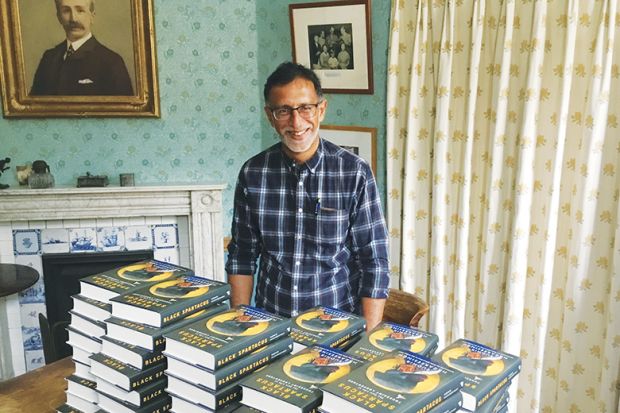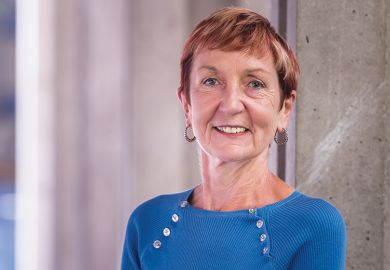Sudhir Hazareesingh is a fellow and tutor in politics at Balliol College, Oxford, who studies French political and cultural history since the Revolution. His latest book, Black Spartacus: The Epic Life of Toussaint Louverture, was announced as the winner of the Wolfson History Prize 2021 last month. The book sheds new light on the emancipated slave who became the emblematic figure of the Haitian Revolution and “the world’s first black superhero”.
When and where were you born?
I was born in Mauritius in 1961. At that time, the island was still a British colony, after having been settled first by the Dutch, and then the French; we finally became independent in 1968.
How has this shaped who you are?
Mauritius is a vibrant democracy where different ethnicities, religions and value systems coexist, an ideal to which I am very attached; I am not moved by any form of tribalism. My father, Kissoonsingh, was a historian and public servant who also loved French and British culture – he studied at the Sorbonne and Cambridge – and I have followed in his intellectual footsteps as I teach at Oxford and carry out research in Paris.
You describe Toussaint Louverture as ‘much more than a glorious relic of the past to be wheeled out at official anniversaries’. Why was a new biography of him needed now?
I found huge amounts of material in the French, British, American and Spanish archives which had not been fully used by previous biographers, and these sources – notably his correspondence – offer new light on his life and his way of thinking, as well as crucial episodes in his career. Just as important, with the struggle for the rights and dignity of black people gaining new momentum and recognition, it is essential to remember the long history and achievements of this emancipatory tradition driven by men and women of African descent. Toussaint Louverture is one of the spiritual ancestors of today’s Black Lives Matter movement.
Why doesn’t the Haitian Revolution figure more prominently in European and US popular history?
For a long time, there was an active erasure of the history of the Haitian Revolution in the West: America and France were seen as the true symbols of the Age of Revolution, and Haiti – to the extent that it was mentioned – appeared as a mere aftershock. Likewise, when abolitionism was evoked, the role of enlightened reformists from the northern hemisphere (Wilberforce, Schoelcher, Lincoln) was foregrounded; the contributions of the enslaved were barely mentioned. Thanks to the seminal work of historians of the Atlantic world over the past few decades, we now have a better appreciation of the major role the enslaved played in first resisting and then overturning the institution of slavery. This is one of the reasons why the Haitian epic is recapturing its rightful place in the history books.
What did you learn about Haiti while working on the book?
I came to realise, first, that my whole way of thinking about the Age of Revolution was lopsided: its real epicentre was not the US or France but Haiti. Its revolution from 1791 through to 1804 was all at once a series of republican, democratic, racial and anti-imperial transformations, which culminated in a war of national liberation against the French. Second, I saw how creative this revolution was – the Haitians took ideas and practices from Africa, Europe and the Caribbean and combined them into an original social and intellectual force which gave the world its first post-colonial black state.
There’s new scrutiny of the legacy of colonialism at Oxford, at other UK universities and at a range of institutions across society, with intense political and media attention directed at this scrutiny. As a historian, how do you view all this?
The focus on colonialism and its legacy is very welcome, especially here at Oxford. Institutions need to be self-aware, and Oxford, of course, was long at the heart of the British imperial project – which had a massive impact on how it saw itself, constructed its educational programmes and treated people coming from the rest of the world, particularly the Global South. There has been some change for the better in those respects, but this legacy is still very active in Oxford, for example with Oriel College’s decision to hold on to its statue of Cecil Rhodes. A colonialist who was highly controversial, and indeed challenged in his own day for his racist imperialism, and who extolled Anglo-Saxon supremacy, should not be publicly celebrated in a university in the 21st century, especially one that claims to believe in racial equality and to be attentive to the demands of its own students and faculty. As a historian, it is perplexing that those who now defend the preservation of the Rhodes effigy were the same sort of people recently cheering the toppling of autocrats’ statues elsewhere.
How do you feel about the future of history at English universities?
I am concerned by the government’s apparent hostility to non-STEM subjects; it appears that any attempt to teach students to think critically is unwelcome. And the current efforts to turn a renewed focus on colonial/imperial history into an element of the “culture war” are just idiotic. Diversifying the curriculum is about widening and deepening our horizons, the opposite of “cancelling”. We want our students to be able to draw from as broad and as rich a range of sources as possible, and make up their own minds.
Is there a particular book that changed the way you think?
I first read The Black Jacobins by C. L. R. James when I was a teenager in Mauritius, and it completely captivated my imagination. It was wonderful to see the world from our own perspective, from the Global South, and learn how the dispossessed can take their destinies in their own hands and change the course of history. It remains one of the best books on the Haitian Revolution.
How did you celebrate your Wolfson History Prize win?
Very soberly on the night itself – I could not believe that I had won – but my partner and I will treat ourselves to a real holiday when it becomes possible. Hopefully in Mauritius!
john.morgan@timeshighereducation.com
Appointments
Adam Tickell is returning to the University of Birmingham as vice-chancellor, five years after leaving to lead the University of Sussex. Professor Tickell, who had a five-year spell at Birmingham between 2011 and 2016 as provost and vice-principal, and pro vice-chancellor (research and knowledge transfer), will join the Midlands institution in January. He will succeed Sir David Eastwood, who has led Birmingham since 2009 and will retire at the end of the year. Professor Tickell said that his ambition was “for Birmingham to be known as the most innovative, vibrant and exciting place to work or study in the UK”.
UNSW Sydney has poached the leader of its cross-town rival to be its next vice-chancellor. Attila Brungs, who heads the University of Technology Sydney, will take over at UNSW when incumbent Ian Jacobs steps down in January. He is a UNSW alumnus who previously worked with consultants McKinsey & Company and Australian science agency CSIRO before joining UTS in 2009, initially as deputy vice-chancellor (research), becoming vice-chancellor five years later. Professor Brungs said that UNSW was “one of the best-placed universities to partner with government and industry to drive the research commercialisation and translation agenda”.
Ross Young is joining Australia’s University of the Sunshine Coast as deputy vice-chancellor (research and innovation). He will succeed Roland De Marco in August, having previously served as executive dean of the Faculty of Health at Queensland University of Technology.
Santiago Schnell will be the next William K. Warren Foundation dean of the College of Science at the University of Notre Dame. He is currently chair of the department of molecular and integrative physiology at the University of Michigan Medical School.
Davide Ravasi is the new director of the UCL School of Management, where he is currently head of strategy and entrepreneurship. He succeeds Bert de Reyck, who is becoming dean of the Lee Kong Chian School of Business at Singapore Management University.
Register to continue
Why register?
- Registration is free and only takes a moment
- Once registered, you can read 3 articles a month
- Sign up for our newsletter
Subscribe
Or subscribe for unlimited access to:
- Unlimited access to news, views, insights & reviews
- Digital editions
- Digital access to THE’s university and college rankings analysis
Already registered or a current subscriber?




